SanDisk Extreme Pro SSD (240GB, 480GB & 960GB) Review: The Fastest Just Got Faster
by Kristian Vättö on June 16, 2014 4:00 PM EST- Posted in
- Storage
- SSDs
- SanDisk
- Extreme Pro
Random Read/Write Speed
The four corners of SSD performance are as follows: random read, random write, sequential read and sequential write speed. Random accesses are generally small in size, while sequential accesses tend to be larger and thus we have the four Iometer tests we use in all of our reviews.
Our first test writes 4KB in a completely random pattern over an 8GB space of the drive to simulate the sort of random access that you'd see on an OS drive (even this is more stressful than a normal desktop user would see). We perform three concurrent IOs and run the test for 3 minutes. The results reported are in average MB/s over the entire time.
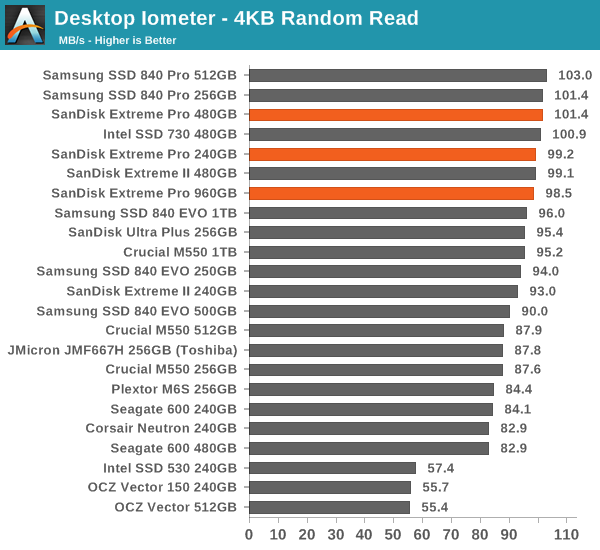
The random read performance is great, which was expected when coming from the Extreme II.
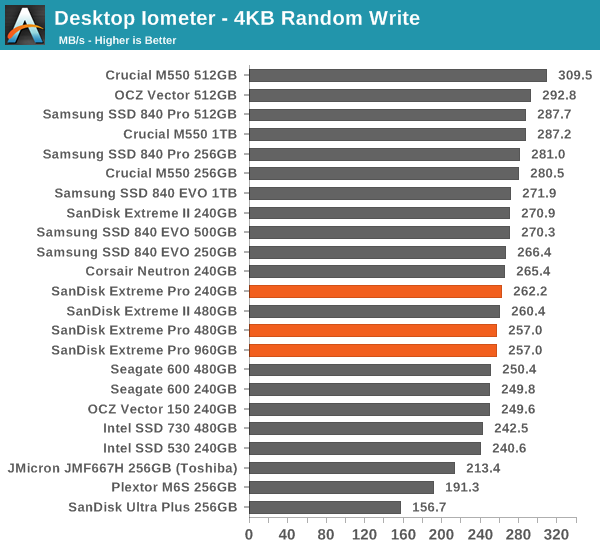
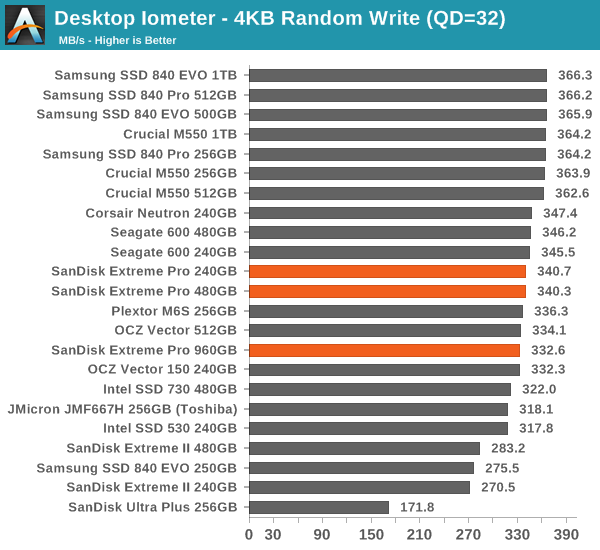
Random write performance, on the other hand, is only mediocre, although it's consistency that matters and not necessarily the peak performance. It seems that drives with high consistency do not have as good peak performance because the Extreme Pro, Vector 150 and SSD 730 are in the middle, whereas the 840 EVO and M550 lead the pack despite their relatively poor IO consistency. I would take consistency over ~10% better peak performance, though.
Sequential Read/Write Speed
To measure sequential performance we run a 1 minute long 128KB sequential test over the entire span of the drive at a queue depth of 1. The results reported are in average MB/s over the entire test length.
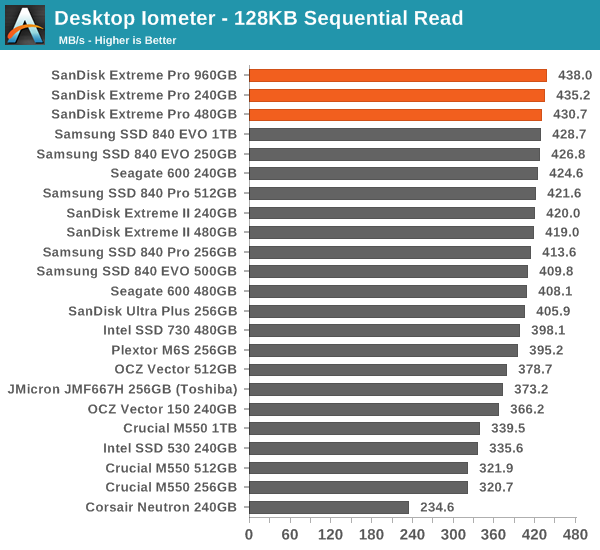
Sequential performance is definitely good. I think the high read speed is one of the reasons why the Extreme Pro did so well in the 2013 Storage Bench because both the SSD 730 and Vector 150 are noticeably slower.
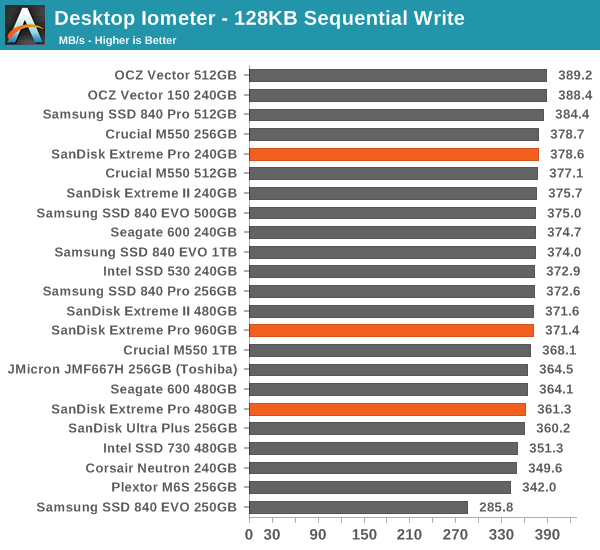
AS-SSD Incompressible Sequential Read/Write Performance
The AS-SSD sequential benchmark uses incompressible data for all of its transfers. The result is a pretty big reduction in sequential write speed on SandForce based controllers.
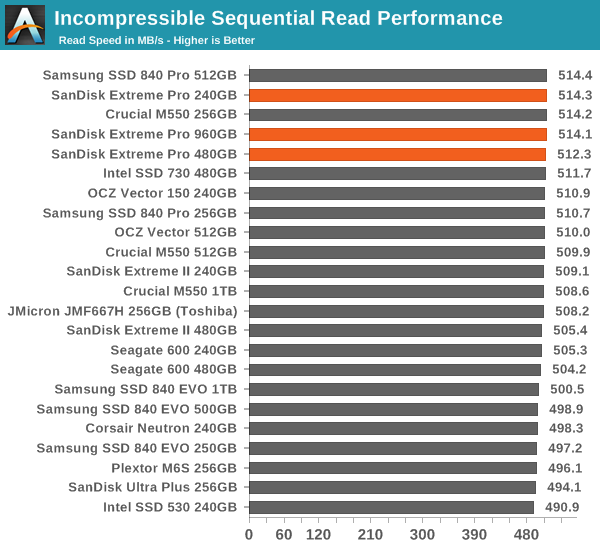
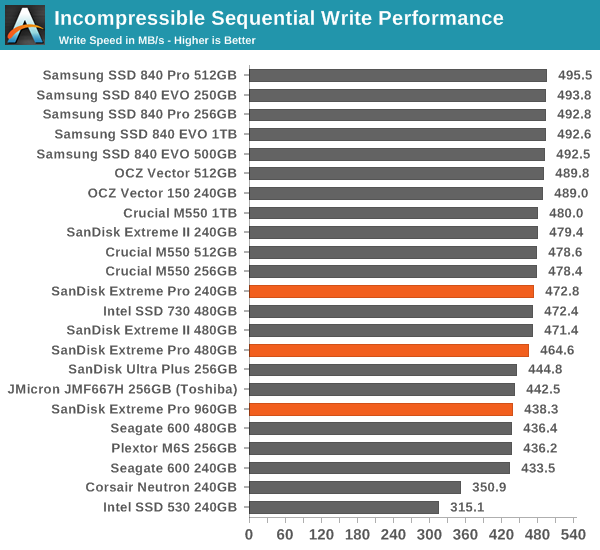










85 Comments
View All Comments
binarycrusader - Tuesday, June 17, 2014 - link
Thanks, that explanation makes the comparison seems a lot more reasonable.By the way, NewEgg is selling the 480GB model for $379.99 today, which makes the Intel one slightly more appealing.
binarycrusader - Tuesday, June 17, 2014 - link
There's still a DRAM cache though, so I'd like to see a torture test on SanDisk's drive before I could be confident. But I'm aware that's potentially bricking the drive so I can understand why you might not be able to do that.I agree that what SanDisk has done seems like it would help mitigate the need for a capacitor, but I just can't be confident about it until some tests are done.
brucek2 - Monday, June 16, 2014 - link
Can anyone recommend a simple Windows utility for profiling your storage usage? I'm picturing something that runs in the background with an icon in the system tray I could mouseover to get a quick take on average daily data written, QD histogram, maybe read/write and/or size mix. It'd be great to be able to take a look at it when I'm reading articles like this to figure out which stats matter most to me.matthew5025 - Tuesday, June 17, 2014 - link
I recommend diskmonhttp://technet.microsoft.com/en-sg/sysinternals/bb...
Essence_of_War - Monday, June 16, 2014 - link
Wherein SanDisk, not content with already having the top data rate and service time in the Destroyer benchmark, takes the title back from themselves.I'm very impressed with their commitment to product quality.
Antronman - Monday, June 16, 2014 - link
At 200USD for 240GB, I'm just not sold.2x HyperX 3K 120GB in your choice of RAID configuration and you've got it, for 40-50USD cheaper.
jameskatt - Tuesday, June 17, 2014 - link
Encryption is always going to slow down your drive. After all, it takes a lot of brute computation to do encryption.The biggest problem of hardware encryption is that you don't have the freedom to select your own encryption algorithm. For example, if the hardware encryption method is compromised then you are screwed if you rely on it.
I would rather keep whole disk encryption at the OS level.
TheWrongChristian - Wednesday, June 18, 2014 - link
Encryption in hardware is easy (at least easier than software) and probably adds very little in terms of latency and power budget. AES is just multiple rounds of XOR, ROM lookups and bit mixing. Quite easy to do in hardware quickly.AES-128 (the minimum AES level) is a long way from being considered broken.
SirKronan - Tuesday, June 17, 2014 - link
Thanks for the review!! I am still going strong with my Extreme II and have yet to have any issues with it. Windows is still running fantastic, since the very first install on this drive. My dad's Extreme II is also running strong. I felt like I was taking a bit of a risk with an unknown when I got a somewhat less popular drive, but the current sale price back then was unbeatable, and to this day I have no regrets. Nice to see they are still coming to town and packing a punch!uruturu - Tuesday, June 17, 2014 - link
Why don't you test the drives in storage bench 2011-2013 with 25% OP???